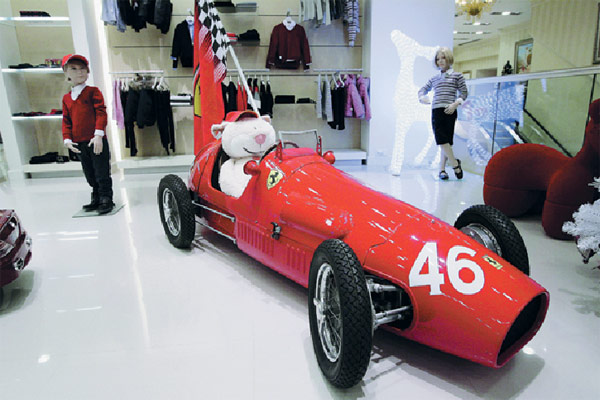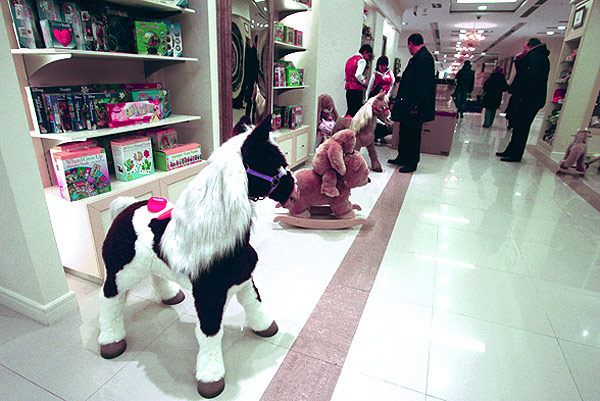 |
A TRANSIENT RECESSION AND EVERLASTING SHOWINESSWhile the rest of the world, profoundly shaken by the recession, is drearily reviving centuries-old values of saving and frugality, Moscow's evergreen habit of showing off sprouts anew. Last December, a new store selling super-expensive children's toys and clothes, where a minimum price tag is RUR10,000 (S$ 460), opened. According to the manager of this luxurious toyshop, it was "conceived and designed as a project with long-term development potential, future-oriented and able to survive the temporary disadvantageous financial state of affairs". Translated into layman's terms, while recessions tend to be temporary, ostentation is eternal.
So far, the store has been generally deserted, with the exception of a lonely handful of browsing journalists, their eyebrows raised in surprise. It is hardly even a store... well, at the very least, it is not a children's store. This is a hangout for those not in the habit of spending, but investing – in factories, plants, ships... It feels less like a toy shop and more like a toy exchange. One has to be a very special boy to enjoy playing with a Hummer model scaled at 1:12 and priced at RUR12,500 (S$ 580), or a Mercedes-Benz W25 for RUR12,350 (S$ 573). Ordinary toy cars are destined to get into "traffic accidents" or "get blown up", with all the wreckage involved, whereas these ones are good for nothing more than being displayed and passed on to future generations as heirlooms.
Actually, all the stuff in this store looks like somebody's collection of unfulfilled childhood dreams. It feels like the items, never bought but admired in the windows of Detsky Mir or at a well-off friend's place, have been gathered in the same place. This may explain why these toys have a sort of retro-flair to them, like a toy washstand with an enamelled washbasin for RUR13,560 (S$ 634), an old-fashioned ironing board for RUR7,800 (S$ 365), or a wicker doll's bed for RUR9,800 (S$ 458), for which today's mothers pined when they were five-year-old girls. Dads can now afford – their kids, to be more precise – a much-desired foot accelerated car (rest assured it will be a Ferrari) with a price tag of RUR151,000 (S$ 5,340). Better late than never, you see.
Stuffed toys are all gigantic and can even move. The "Bear in the Chair" features an almost life-sized polar bear rocking its cub in its lap and grinning rather ominously; it costs RUR42,950 (S$ 2,000). The interactive toy pony "Iriska" ("Toffee") for RUR22,500 (S$ 1,045) shakes its head with a muffled mechanical buzz and snorts; it comes with a plastic carrot and brush. The only species that keep silent and immobile are a plush triceratops going for RUR16,000 (S$ 750) and a brontosaurus priced at RUR13,500 (S$ 630).

The toy assortment reveals a tendency to enlighten buyers. Pewter soldiers, for instance, have historical significance: there are the Streltsy , Russian knights, Peter I's armed force – at RUR5,680 (S$ 266) per set. The multinational armies feature samurai squads and Roman cohorts. Outstanding characters are sold by piece, with a cross-wielding Grigory Rasputin being the cheapest, at a mere RUR5,180 (S$ 243). The most expensive representation is that of Alexander of Macedonia which costs RUR9,900 (S$ 464). Ivan the Terrible and Winston Churchill are equally priced at RUR5,850 (S$ 274) each. You can cut a deal by buying royalty in bulk: the "Russian Tsars" featuring Peter I, Catherine II, Ivan the Terrible, etc. go for RUR5,680 (S$ 266). Our contemporaries – a pewter Gorbachev, Putin, Yeltsin, Lenin, Brezhnev, Stalin and the shoe-brandishing Khrushchev – can be purchased en masse. Why children would want these mysterious people beats us: they would instead make a nice gift for an irritable reactionary grandpa, having somewhat psychotherapeutical properties. He would really enjoy placing these pewter rulers on the table so that he could shoot some down with canons of mashed bread (which ones exactly would depend on his political preferences).
In the babies' department, the pricing policy is illogical to a fault – a RUR67,000 (S$ 3,146) cradle is very unlikely to find an owner any time soon. But the most shocking item awaits customers in the "stationary" department. Behind the glass, there is a tome of Pushkin's "Fairy Tales" for RUR265,000 (S$ 12,445). From its appearance, it is nothing less than an incunabula flashing with a golden cut, enamel, artificial diamonds, exclusive marble paper and gilt. It might as well have been set in a golden frame, icon-like, and it feels weird that it isn't. Indeed, Pushkin "is our everything ".

We must admit that this "toy industry achievements fair" is not devoid of some tactile aesthetics, such as a tiny tricycle for RUR10,220 (S$ 480) that is slick as a grand piano's lid and feels good to the touch. Besides, there are many truly unique items here, like a working model of a Stirling steam engine. It operates on a mix of dry spirits and water, and its price ranges from RUR15,000 to RUR40,000 (S$ 705 to S$ 1,878). However, the children whose parents can afford such toys cannot be expected to appreciate their folks' taste and financial sacrifices. With their eyes sparkling at the sight of mass-produced Bratz dolls or similar rubbish from TV commercials, they would rush to these shelves and cry their lungs out: "I want the same one as on the telly!"
The modus operandi of this children's "VIP toy paraside" is simple: it should only be used for buying gifts for the boss' children. It would both please the chief and be light on your pocket, provided that all your fellow employees chip in. Yes, chipping in has become a sign of today's reality, one into which the whole world has been corralled by the global recession. And this toy store in Moscow's central Yakimanka District, whose target clientele is the "five per cent of wealthy Moscovites", is nothing more than a of museum of yesterday's life, a life of showiness that has turned out to be too expensive even for Russia's oligarchs. Or has it, after all?
|
|
 +65 6696 7068
+65 6696 7068
 info@meridian103.com
info@meridian103.com
 PDA
PDA
 +65 6696 7068
+65 6696 7068
 info@meridian103.com
info@meridian103.com
 PDA
PDA
